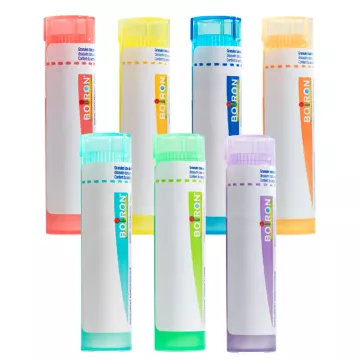

What is irritable bowel and what are its main symptoms?
Irritable bowel syndrome (IBS) is a chronic digestive disorder characterized by a combination of symptoms that can vary from person to person. The most common symptoms include abdominal pain, bloating and changes in stool frequency or consistency. These symptoms can be intermittent, and are often exacerbated by factors such as stress or diet.
What causes irritable bowel syndrome?
The exact causes of irritable bowel syndrome are not fully understood. However, several factors seem to play a role. Among them, imbalances in intestinal flora, abnormalities in intestinal motility, visceral hypersensitivity, stress and psychological factors are often cited. Food intolerances can also contribute to the onset of symptoms.
How is irritable bowel syndrome diagnosed?
Irritable bowel syndrome is generally diagnosed on the basis of symptoms reported by the patient, in the absence of other organic causes. Doctors often refer to specific diagnostic criteria, such as the Rome IV criteria. Additional tests may be carried out to rule out other conditions, such as inflammatory bowel disease or infection.
What treatments are available for irritable bowel?
Treatment for irritable bowel focuses primarily on managing symptoms. This can include dietary changes, such as adopting a diet low in FODMAPs, which has been shown to reduce symptoms in many patients. Probiotics, certain medications to regulate intestinal motility or relieve pain, as well as behavioral and psychological therapies, may also be beneficial.
Is there a cure for irritable bowel syndrome?
At present, there is no definitive cure for irritable bowel. However, many people are able to effectively manage their symptoms and maintain a good quality of life through a combination of medical treatment, lifestyle changes and stress management strategies.
What dietary changes are recommended for irritable bowel sufferers?
For people with irritable bowel, it is often advisable to adopt a balanced diet while avoiding foods that trigger symptoms. Foods rich in FODMAPs, such as certain fruits, vegetables, dairy products and cereals, can be problematic. A low-FODMAP diet can be tried under medical supervision. It is also important to drink enough water and eat at regular times.
Can exercise help relieve irritable bowel symptoms?
Yes, exercise is often recommended for irritable bowel sufferers. It not only helps reduce stress, but also improves bowel transit. Gentle, regular activities such as walking, cycling or swimming are particularly beneficial. It is important, however, to consult a healthcare professional before starting any new exercise program.
How can medication help in the treatment of irritable bowel?
Depending on the specific symptoms, various medications may be prescribed. Antispasmodics to reduce abdominal pain, laxatives or antidiarrheal drugs to regulate intestinal transit, and sometimes low-dose antidepressants for their effect on the digestive nervous system. It's essential to discuss these options with a healthcare professional to find the most suitable treatment.
Are there any natural remedies for irritable bowel?
Several natural remedies can help. Probiotics, for example, can help rebalance intestinal flora. Herbs such as peppermint have natural antispasmodic properties. Ginger can help relieve nausea and aid digestion. However, it is important to consult a healthcare professional before starting any natural treatment, to ensure that it is appropriate and does not interact with other medications.
What is the relationship between irritable bowel syndrome and diet?
Diet plays a crucial role in managing irritable bowel symptoms. Certain foods can aggravate symptoms, while others can relieve them. It is advisable to keep a food diary to identify trigger foods. Foods frequently involved include high-fat products, spicy foods, coffee, alcohol and soft drinks. Adopting a low-FODMAP diet is often recommended to identify problem foods.
Can irritable bowel be prevented?
While there's no guaranteed way to prevent irritable bowel, certain measures can help reduce the risk or alleviate symptoms. These include maintaining a balanced diet, getting regular exercise, managing stress and getting regular, restful sleep. Avoiding or limiting foods known to trigger symptoms can also help.
Are probiotics effective in treating irritable bowel?
Probiotics, which are beneficial micro-organisms, can play a role in managing irritable bowel. They can help rebalance intestinal flora and improve digestive health. Studies have shown that some probiotics can help relieve symptoms of irritable bowel, including bloating and irregular stool frequency. However, effectiveness can vary from person to person, and it's important to choose specific probiotic strains recommended for IBS.
Is hydration important for irritable bowel sufferers?
Adequate hydration is essential for everyone, but it's particularly important for irritable bowel sufferers. Drinking enough water helps maintain bowel regularity and can prevent constipation, a common symptom of IBS. It is recommended to drink water rather than beverages containing caffeine or artificial sweeteners, which can worsen symptoms.
What role do dietary fibres play in the treatment of irritable bowel syndrome?
Dietary fiber is important for digestive health. For irritable bowel sufferers, fiber can help regulate intestinal transit. However, the type and amount of fiber may vary according to individual symptoms. Soluble fibers, found in foods such as oats and bananas, are generally better tolerated, while insoluble fibers, found in bran and certain vegetables, can sometimes aggravate symptoms. It is advisable to introduce them gradually into the diet to assess their effect.